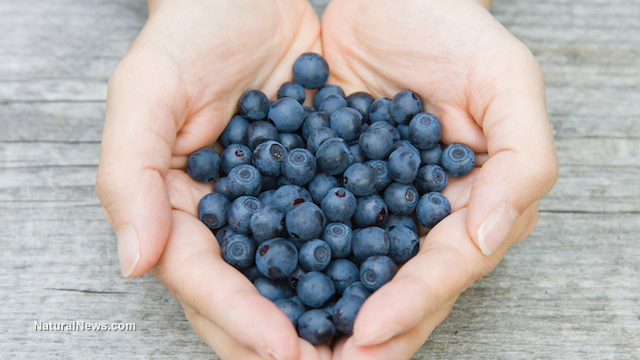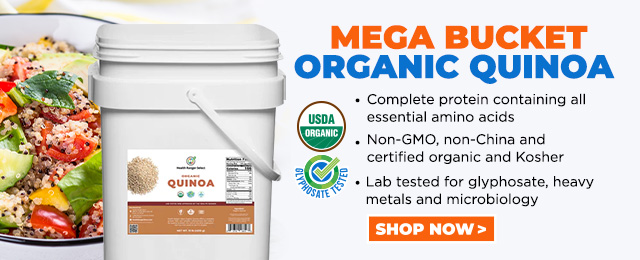Blueberries can help fight Alzheimer's
Sunday, April 10, 2016 by: Sarah Landers
Tags: blueberries, Alzheimer''s disease, superfood antioxidants

(NaturalNews) Alzheimer's is a progressive disease that gets worse over time and is the most common form of dementia. According to the Alzheimer's Association, it is a disease that normally affects people over 65, however, 5% of sufferers have early-onset Alzheimer's, meaning that they are only in their 40s or 50s.
It is estimated that more than 26 million people worldwide suffer from Alzheimer's, as reported by Waking Times, and that by 2050 this figure will quadruple.
At present there is no known cure for Alzheimer's, but an increasing number of studies support the idea that "superfoods" such as blueberries might be able to help fight the onset and progression of the disease. According to Medical Xpress, blueberries are already known to lower the risk of heart disease and cancer, but new research has shown that they might be a useful way of preventing Alzheimer's disease and its associated symptoms.
Blueberries as a super fruit
According to FitDay, blueberries have gained super fruit status because of their high concentrations of antioxidants and phytonutrients. These compounds have been linked to preventing cell damage by neutralizing radicals, while also preventing inflammation and protecting against cancer and chronic heart disease.Inflammation is a known cause of Alzheimer's, and new research from the University of Cincinnati Academic Health Center has shown that "blueberries can have a real benefit in improving memory and cognitive function in some older adults," according to Robert Krikorian, PhD, leader of the research team.
As reported by Medical Xpress, blueberries also contain flavonoids known as anthocyanins, which have been shown to improve brain function and slow down brain aging in animal studies.
Meanwhile, according to FitDay, blueberries are also thought to reverse short-term memory loss, and their antioxidants can improve motor skills. These antioxidants include anthocyanins, proanthocyanins, resveratrol, flavonols and tannins – all of which have been linked to preventing the growth of cancer cells.
But the power of blueberries goes beyond their antioxidant content – they also contain a wealth of vitamins that are important to the health of your whole body, such as vitamin A which is vital for your eyesight.
Turmeric also an Alzheimer's-fighting superfood
A recent study focusing around the use of turmeric powder as a potential treatment for Alzheimer's has had surprising results, as reported by Waking Times. After three months of treatment, the patients studied being showed an improvement in their symptoms, and the report in the Indian journal Ayu states that "in one case, the Mini-Mental State Examination (MMSE) score was up five points... they came to recognize their family within 1 year [of] treatment." Could it really be the case that this popular spice most commonly found in the kitchen also has a place in the medicine cupboard?To date, there are 114 different studies which show indications that turmeric has neuroprotective properties, and two in particular show that one of the compounds – curcumin – can enhance the clearance of pathological brain plaque, as well as inhibit the development of Alzheimer's.
The benefits of natural treatments for Alzheimer's are undeniable, and these studies show that we should always look to Mother Nature as well as modern medicine when treating disease.
Studies have recently found a link between a common prostate cancer treatment and Alzheimer's which is thought to as much as double the likelihood of patients developing Alzheimer's. While this isn't yet confirmed, it is something that oncologists are now taking into account when deciding what treatment is best for prostate cancer. Should doctors be looking for more natural ways to intervene with – and cure – diseases?
Sources include:
MedicalXpress.com
WakingTimes.com
NCBI.NLM.NIH.gov
Medicine.news
TruthWiki.org
Alz.org
FitDay.com
Science.NaturalNews.com
Blueberries at FETCH.news
Get independent news alerts on natural cures, food lab tests, cannabis medicine, science, robotics, drones, privacy and more.
Take Action: Support Natural News by linking to this article from your website
Permalink to this article:
Embed article link: (copy HTML code below):
Reprinting this article:
Non-commercial use OK, cite NaturalNews.com with clickable link.
Follow Natural News on Facebook, Twitter, Google Plus, and Pinterest
- Newly released JFK files reveal Pentagon's role in creating Lyme disease and covid in the same lab
- The hidden dangers in your kitchen: How cooking methods impact diabetes, cancer and aging
- DEADLY DECEPTION: How COVID vaccines increased mortality rates and why authorities hid the truth
- CDC finally halts $11 billion COVID funding scam as health officials admit the ‘pandemic’ was a fraud
- Arkansas embraces medical freedom with landmark ivermectin law
- GAIN-OF-FUNCTION CAT-BIRD-FLU now on the rise as nearly a dozen cats in Colorado "test positive" for Bird Flu due to contaminated cat food
- Lab leak confirmed? Boris Johnson's stunning reversal on COVID origins sparks global debate
- Home gardening for preppers: A beginner's guide to growing your own food
- Trump's greatest betrayal so far: Accelerating Middle East wars, silencing dissent, and serving Zionist masters
- Here are TEN all-natural ways to protect your garden without using harmful chemicals
- Why you should think twice before buying mainstream toothpaste formulas
- Cartels shift tactics: Kidnappings and organ trafficking surge as border crossings plummet under Trump policies
- ATTENTION PRESIDENT TRUMP: Please WITHDRAW your nomination of Dr. Susan Monarez for CDC Director as she is a VAX FANATIC and TOXIC JAB ZEALOT
- Was JFK's assassination orchestrated by a CIA double agent? New evidence points to James Angleton as the “architect”
- Record honeybee deaths devastate U.S. agriculture, pesticides under scrutiny
- Paper or plastic? The environmental deception behind bag bans
- Speaker Johnson warns Congress may defund or disband rogue courts targeting Trump
- “Endgame: The Hidden Agenda 21” unveils a world of conspiracy and control
- Newly released JFK files reveal Pentagon's role in creating Lyme disease and covid in the same lab
- Elon Musk: Aliens could be here on Earth RIGHT NOW
- Festive flavors: The sweet history, nutritional profile and health benefits of pecan pie
- Trump reverses course on Gaza plan, says “nobody is expelling Palestinians”
- Reclaim your health: How midlife exercise reverses years of inactivity
- Big Pharma's $8 Billion bribery scheme exposed: how doctors are pushed to prescribe junk science, not heal
- Boys are back in town: Trump’s patriotic alpha crew takes the wheel while toxic females ride in the backseat
- EPA advisor admits the agency is funneling billions to climate groups ahead of Trump’s return to White House
- Space war brewing? Russia threatens to destroy Starlink satellites
- Survival 101: Effective EMF blocking techniques
- A lack of integrity in Academia: Harvard professor found GUILTY of fraudulent research to promote CRT theory
- Mike Adams Sermon 66: God will DESTROY ISRAEL for its wickedness
- 5 Simple steps to boost your brainpower: How to strengthen executive function in a distracted world
- Rep. Nancy Mace introduces bill to ban biological males from female facilities on federal property
- Sugarcane extract superior to cholesterol-lowering drugs?
- WHO focusing more on policing speech about public health and implementing global surveillance systems
- Pilots report mysterious lights 'moving at extreme speeds' across Oregon skies
- Dr. Mike Yeadon releases 15-minute testimony - WATCH - about genocidal intent of COVID “vaccines”
- EPA advisor admits the agency is funneling billions to climate groups ahead of Trump’s return to White House
- The Health Ranger releases “Vaccine Zombie” song and music video, using AI-animated zombies for the music video
- California's social media censorship law struck down: A victory for free speech or a threat to online safety?
- Dr. Mike Yeadon releases 15-minute testimony - WATCH - about genocidal intent of COVID “vaccines”
- The pandemic as a tool for INDOCTRINATION: Understanding “The Indoctrinated Brain” by Dr. Michael Nehls
- Florida takes a stand: DeSantis proposes permanent ban on mRNA vaccine mandates
- Mike Adams releases country western hit single: Goin’ Back in Time is Comin’ Home
- Mike Adams releases music poetry sensation: A Child of God
- “Why we influenced the 2020 elections”: Facebook files reveal the coordinated effort to bury the Hunter Biden laptop story
- RFK Jr. clears key hurdle: Sen. Susan Collins backs controversial HHS nominee, signaling a new era for health policy
- Unpacking the Lies That We’ve Been Fed – new song and music video released by Mike Adams, the Health Ranger
- Mike Adams releases new song and music video: Nothing More Disgusting Than a Globalist
- Newly released JFK files reveal Pentagon's role in creating Lyme disease and covid in the same lab
- Congratulations to the FULLY UNVACCINATED as you resisted the COVID-19 PROPAGANDA MACHINE fueled by over $100 BILLION
- Michigan sheriff announces criminal investigation into 2020 election crimes, Dominion Voting Systems
- Israeli soldiers accused of even more torture and abuse in the West Bank
- Migrants are taking advantage of recent hurricanes to scam residents and loot their homes
- House Intelligence Committee calls for the ARREST and PROSECUTION of Dr. Anthony Fauci
- Red Cross issues warning to stop blood plasma donations from vaccinated people
- Scientists confirm: GENIUS brain function can be spontaneously unleashed in humans without any apparent cause
- EPA advisor admits the agency is funneling billions to climate groups ahead of Trump’s return to White House
- HYSSOP: What research reveals about the health benefits of this ancient holy herb
- Two containers with completed ballots fall out of truck in Florida
- Fully vaccinated about to see “tsunami” of illness and death, warns virologist
- Global leaders unite to clamp down on “misinformation” with UN-backed Cascais Declaration
- BREAKING: 2025 NDAA authorizes mandatory military draft of WOMEN across America… as Pentagon pursues global NUCLEAR war with both Russia and China at the same time
- Michael Yon warns of a ZIONIST TAKEOVER in Trump’s second administration
- BOMBSHELL: DNA testing kits are a SCAM to develop ethnic-specific bioweapons
- Ozempic and Wegovy weight loss drugs are injectable LIZARD VENOM PEPTIDES that may unleash a devastating wave of organ failure… side effects align with symptoms of SNAKE BITES
- Israeli soldiers accused of even more torture and abuse in the West Bank
- These 13 countries just signed an agreement to engineer a global FAMINE by destroying food supply
- NASA admits that climate change occurs because of changes in Earth’s solar orbit, and NOT because of SUVs and fossil fuels
- RFK Jr. clears key hurdle: Sen. Susan Collins backs controversial HHS nominee, signaling a new era for health policy
- Sermon 30: How Jesus reveals Caesar’s FAKE CURRENCY and FALSE AUTHORITY
- Coriander seeds: Ancient medicine backed by modern science
- Arizona officials claim Maricopa County needs 10-13 days to tabulate results of the election
Science News & Studies
Medicine News and Information
Food News & Studies
Health News & Studies
Herbs News & Information
Pollution News & Studies
Cancer News & Studies
Climate News & Studies
Survival News & Information
Gear News & Information
News covering technology, stocks, hackers, and more



"Big Tech and mainstream media are constantly trying to silence the independent voices that dare to bring you the truth about toxic food ingredients, dangerous medications and the failed, fraudulent science of the profit-driven medical establishment.
Email is one of the best ways to make sure you stay informed, without the censorship of the tech giants (Google, Apple, Facebook, Twitter, YouTube, etc.). Stay informed and you'll even likely learn information that may help save your own life."
–The Health Ranger, Mike Adams












































